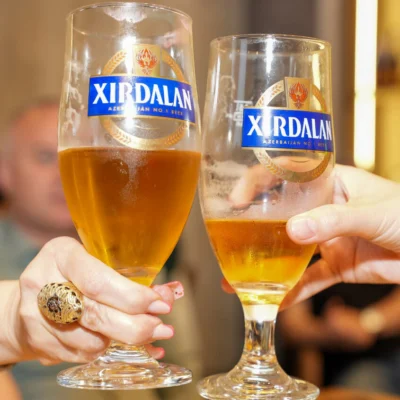Fun facts about beer

We all love beer, some more than others, some less. It is for those who treat beer as more than just a hangover cure that I am publishing this collection of beer facts.
George Washington ran his own beer hall.
A law in the city of Ames, Iowa, prohibited a man from going to bed with a woman if he had had more than three sips of beer.
Shortly after the war, the magistrate of Leipzig was looking for money for the city budget. They raised the price of bread – it passed, for cigarettes – the population was silent. But as soon as the price of beer went up by one pfennig, mass riots broke out.
The beer industry generates $200 billion annually for America.
Not long ago, Oxford University student Tom Bowder demanded a mug of beer during an exam, citing an old tradition. Since England honors tradition, he received a mug of beer, but was immediately fined for violating another old rule that students must appear for the exam with swords.
Four thousand years ago in Babylon, there was a tradition: in the first month after the wedding, the bride’s father would give the groom a “beer month”. This meant that the groom could drink beer for a whole month at the expense of his father-in-law.
In 2016, brewers from the Danish concern Carlsberg managed to reconstruct a 140-year-old beer. Yeast, was extracted and regenerated from found old beer, and the original malt variety was specially cultivated.
In 2019, the world’s first beer was brewed in Israel from 3,000-year-old beer yeast found during excavations and regenerated!
More than 100 years ago Kharkiv brewery No. 1 “New Bavaria” was founded, and all these years it brewed high quality beer. It was believed that it primarily depended on the delicious water, which was taken from the well on the territory of the brewery. Someone suggested that it was not simple water, but mineral water. And the analysis confirmed the guess. The new mineral water was named Bavarian.
A major beer pub in London holds an annual election for the biggest beer drinker among its regular customers. In 1991, Harriet Brooks from Birmingham was awarded the honorary title. She stated that she had been drinking more than a liter of beer every day since she was 18 years old. Harriet Brooks is the age of the century. The pedantic British have calculated that Brooks has drunk 70 tons of beer in 73 years.
In one of Munich’s beer pubs, beer is served in unusual beer mugs. As soon as you pick up such a mug from the table, a Bavarian folk tune sounds. These ceramic mugs are manufactured in Czech Republic.
There is a “beer bell” in the Polish city of Gdansk. The bell used to be rung to authorize the opening of beer pubs in the city.
The British Red Cross took legal action against a pub in Swerton, accusing its owner of illegally appropriating its name. The pub is also called the Red Cross. However, the lawsuit had to be dropped because it turned out that the pub dates back to Crusader times.
From IsraBeer: Perhaps we should have filed the same counterclaim.
In Dutch villages, it is not uncommon to find a mailbox in the form of a beer barrel.
The Brzeg container factory in Poland has built a Diogenes town on the shore of a lake for its workers, whose houses are made of old oak barrels.
American architect Mike Reynolds builds houses out of beer cans. He ties eight empty cans into a single block with wire and joins them with cement. It takes 40,000 cans to build a house with two bedrooms, a living room, a dining room and a kitchen.
In the city of Padua in Italy, beer lovers built a 1/4 life-size replica of St. Anthony’s Cathedral out of beer cans. This construction cost 3 million 45 thousand beer cans.
A herd of 20 elephants was attracted to the village of Jauhati in the Indian state of Assam by the smell of beer that the villagers were brewing for a local festival. The elephants emptied barrels of rice beer and pounced on people, killing five people and injuring many others.
In the American city of Natchez, Missouri, there is a law prohibiting the drinking of beer to elephants.
Not so long ago in the night restaurants of the English city of Brighton demonstrated as an attraction a giant snail 30 centimeters long and weighing half a kilogram. It was famous for drinking beer.
Thirty-year-old New Zealander Jack Manukau died while attempting to set a world record for beer consumption. He managed 77 mugs… and died.
Beer freezes at -2.5°C to -3.0°C. Once thawed, it can be drunk, but it loses its flavor.
In Sierra Leone’s diamond mines, gems are examined in beer. According to English geologists, it is in beer that the visual qualities of diamonds become apparent.
In 1947, the American writer Mencken signed a contract with a Canadian movie company. For the right to screen the book, the company undertook to supply the author with two cases of pale ale every month for the rest of his life.
There is a small street in Luxembourg that bears the name: “Where Mosel beer is brewed”.
In Bohemia and other countries in the old days, the quality of beer was given great importance. The owner of the brewery had to pour a bucket of beer onto an oak bench, on which the members of the local magistrate, dressed in leather pants, sat down. If their pants stuck to the bench for a certain period of time, the beer could be sold.
Near the town of Marandellas in Zimbabwe, a tanker of beer overturned. Cows were grazing nearby and decided to have a taste of beer. Some of them were so drunk that they began to “molest” passers-by and interfere with traffic. The shepherds failed to subdue the cows. In the morning, cows sobered up and began to nibble the grass obediently.
The program of a party of beer lovers at a Swedish university consists of a single point: to run a “beer pipeline” from the Tuborg factory directly to the student dormitory, so that every room would have life-giving water flowing from the tap.
Munich Airport is the first airport in the world to brew its own beer.
The best way to fight rodents is… alcohol. The recipe of Zambian sorcerers, which peasants have been using for hundreds of years, is simple: at night, bowls of milk with a little beer in them are left in the house, where mice or rats have taken up residence. In the morning, the “harvest” is collected. The drunken rodents offer no resistance.















